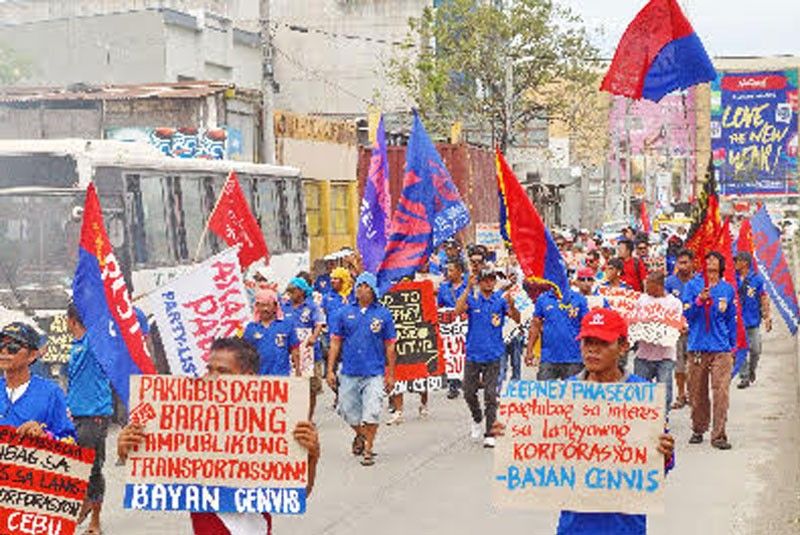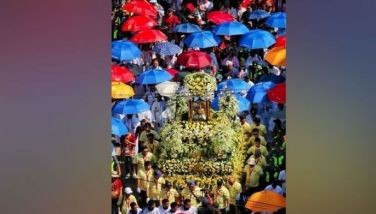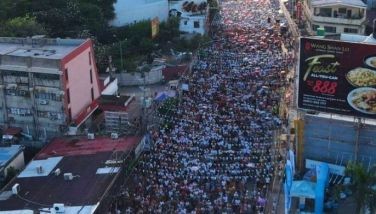Heavy disruptions only in 2 cities: PUJ strike fails to cripple metro

CEBU, Philippines - Yesterday’s nationwide strike did not cripple transportation in Metro Cebu albeit the Pinagkaisang Samahan ng mga Tsuper at Operators Nationwide (PISTON) claiming the protest was successful.
The strike here lasted for over 11 hours, starting at 4 a.m. and ending at 3:25 p.m.
Greg Perez, coordinator of PISTON - Central Visayas, told The Freeman the protest action affected 80 percent of the transportation in Mandaue City, Lapu-Lapu City, and Danao City where majority of its members operate.
Perez said the intent was not to paralyze traffic but air their sentiments, both to authorities and the public, against the move of government to phase out jeepneys that are at least 15 years old.
Contrary to Perez’s assessment, however, the Land Transportation, Franchising and Regulatory Board (LTFRB) said the strike affected only 20 percent of public transport in Metro Cebu.
“Only 20 percent of public transport in Metro Cebu was affected, mostly in Lapu-Lapu and some parts of Mandaue from 7 a.m. to 8 a.m. only but was immediately augmented by LTFRB buses with special permits, government buses and vehicles. After that time (7 a.m. to 8 a.m.), normalized na ang public transport,” said LTFRB-7 Director Ahmed Cuizon.
Senior Superintendent Rey Lyndon Lawas, deputy regional director for operations, said the strike was generally peaceful.
“Generally peaceful. No problem as long as the transport strike is concerned,” he said.
He said the drivers who convened in different areas in Cebu City, Mandaue City, and Lapu-Lapu City, did not disturb the flow of traffic.
“Ato ra ni silang gi-monitor kay they have not disturbed the flow of traffic man… wala man silay other violent acts that would tend us to disperse them. We respect their rights basta di lang sila mugubot,” he said.
Meanwhile, Cuizon said LTFRB received the counter-proposal of the Cebu Integrated Transport Multi-purpose Cooperative, National Confederation of Transportworkers Union-Central Visayas, Alyansa sa Nagkahiusang Draybers at Operators Nationwide, and Basak Lapu-Lapu Jeepney Operators and Drivers Association on how government should carry out its transport modernization project.
The groups did not participate in yesterday’s strike but said in the proposal, "We are not against modernization, but our government has no plan or study how it will be implemented and we are not also against modernization of jeepneys. But we are opposing the mandatory replacements of current jeepneys to the supposedly new imported e-jeeps [electric jeepneys] or even new Euro 4-type jeeps, which are very costly and expensive."
The groups are asking that government implement the modernization project gradually starting 2018 and until 2026. They said LTFRB must also put rules in place covering the modernization project.
Situations
As LTFRB said, the strike affected Mandaue City and Lapu-Lapu City for the most part.
In Mandaue, the strike affected the routes from Mandaue City to Ayala, Foodland, SM City, and V. Gullas Street in Cebu City but the Traffic Enforcement Agency of Mandaue (TEAM) said vehicles were deployed as early as 5 a.m. to help ferry commuters.
"Mga alas 5 pa lang sa buntag, nagsugod na ug pagpanghakot ug pasahero ang kagamhanan kinsa nipagawas sa mga sakyanan aron mohakot ug pasahero paingon sa dakbayan sa Sugbo diin sa Ayala ug Foodland ang gihimong drop off point," said TEAM operations head Glenn Antigua.
Mayor Luigi Quisumbing also said yesterday, “The LTFRB as well as the departments of City Hall deployed vehicles and we are continue to deploy vehicles throughout the day so ma-mitigate nato ang effect.”
“The single biggest problem that I have now is asa ihatag ang gasoline para sa gigamit nga sakyanan sa cities karon. Hopefully, those that decided to strike would be willing to help in the payment of the gas,” the mayor said.
In Lapu-Lapu City, authorities estimated 4,000 commuters had to be ferried by vehicles provided by the city government. Eight Elf trucks from barangays and two from City Hall transported the city’s residents who were bound for Mandaue City and Cebu City.
Andy Berame, officer-in-charge of the Lapu-Lapu City Disaster Risk Reduction Management Office, said only around six jeepneys operated in the morning but the city was ready with a contingency plan until about 15 jeepneys operated by midday.
Aside from the trucks, five Ceres Liner buses also helped transport commuters.
Mario Napule, officer-in-charge of the City Traffic Management Systems, said the response went smoothly.
"So far, no passenger was left stranded. Vehicles (from City Hall) were immediately deployed. No untoward incidents were also reported," he said.
In Cebu City, Councilor Dave Tumulak said the strike barely affected public transport because there was enough number of jeepneys that operated.
“Mura ra og walay strike pero nahasul gyud ang Cebu City government with the preparation and spends money for the gasoline, food for the drivers, policemen ug uban pa,” matud pa ni Tumulak.
According to the Traffic Patrol Group, the areas that were affected by the strike were barangays Talamban, Guadalupe, Pardo, Mabolo, and Inayawan.
Like in Cebu City, the strike did not have a massive effect in Talisay City. Almond Dela Peña, head of the City of Talisay Traffic Operations Development Authority (CT-TODA), said the city also prepared three city-owned buses, as well as buses from barangays Jaclupan, San Isidro, San Roque, and Tabunok.
The buses ferried passengers from Barangay Linao in Talisay to Plaza Independencia in Cebu City and from Barangay Tabunok go the South Bus Terminal, also in Cebu City.
"Wala man say report nga naay mibabag sa mubiyahe para paapilon sa strike," he said.
In a related development, Talisay City Assistant Schools Division Superintendent, Dr. Cartesa Perico, said that because classes were suspended yesterday, schools in the city will conduct make up classes to complete the number of school days this year.
Comment
For Mandaue Chamber of Commerce and Industry (MCCI) president Glenn Soco, the transport strike was counter-productive because it affected the riding public negatively.
"There is really no need to have a transport strike. It will only aggravate the situation and it will not work. If they just want to be heard, then much better they just talk it out with government. In the long run, we will really push for a mass transport system, which will harmonize with our economic growth," Soco said. — Mitchelle L. Palaubsanon, Garry B. Lao, Christell Fatima M. Tudtud, Mylen P. Manto and Iris Mariani B. Algabre (FREEMAN)
- Latest






















